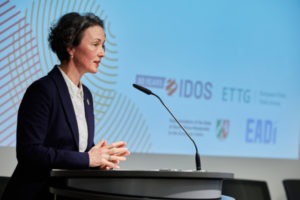Together with the State of North Rhine Westphalia to the EU, and in association with the European Think Tanks Group (ETTG) as well as the European Association of Development Institutes (EADI), IDOS organised a public panel discussion at the NRW representation in Brussels to celebrate IDOS 60th anniversary.
European development policy faces a turbulent global environment. As a key advocate and driver of the 2030 Agenda for Sustainable Development, the EU carries a special responsibility for advancing the agenda’s ambitions. Nevertheless, while progress towards realising the 2030 Agenda and its SDGs is off-track, much attention is drawn towards addressing the simultaneous polycrises of the Russo-Ukraine War, conflict and upheaval in the Middle East, an unequal global recovery from the Covid-19 pandemic and the consequences of vaccine hoarding, and the deepening crises of climate change and biodiversity loss. The EU has reacted quickly and consequently to some of these challenges, but struggles with the changing nature of its relationships with ‘the Global South’, where many countries have very different interpretations of these crises.
Ahead of the European Parliament elections and a subsequent appointment of the next EU Commission, the panel with high level policymakers from the European Commission, the European External Action Service, the European Parliament as well as academic experts discussed the strategic orientation of EU development policy. In 2019, Commission President Ursula Von der Leyen called for “A Union that strives for more” and pledged to lead a “geopolitical Commission”. Panellists agreed that with Global Gateway and Team Europe the EU has made important steps towards becoming a better placed and geopolitical actor. But whether these steps have been ambitious enough in light of the current polycrises was a topic of controversial debate at the panel – with some members arguing that the EU was further losing legitimacy and trust from its partners by more explicitly using development assistance to promote its own interests.


